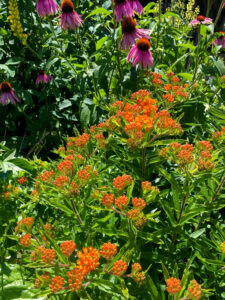Plant beautiful and ecologically relevant plants that are essential to certain wildlife, such as milkweed. Plant milkweed in a pot, in your garden or bedside your mailbox. Several are good (one to five), but too many milkweeds can actually be harmful.
Find the right milkweed for your area, grown from Georgia seeds so the flowers bloom for Monarch butterflies during their migrations. Also consider planting a spring native wildflower for nectar for spring Monarch migration, and plant a fall blooming native wildflower for their fall Monarch migration. Swallowtail Butterflies need Carrot family plants, Maypops are good habitats for Gulf Fritillary Butterflies, Blueberry plants for Southeastern Blueberry Bees, and other native plants also cultivate a beneficial environment for other species. These butterflies, moths, and bees, need this food for their daily lives, and their migrations.

Types of trees that help bees’ lives are black locust, chaste tee, sumac, cherry, crabapple, crape myrtle, catalpa, tulip poplar, eastern redbud and red maple. Caterpillars love zebra swallowtail butterfly, and oaks are important to butterflies and moths.
Plants that help monarch butterflies include: Whorled Milkweed (Asclepias verticillata), Clasping Milkweed (Asclepias amplexicaulis), Buttery Weed (Asclepias tuberosa), Red-ring Milkweed (Asclepias variegata), Eastern Swamp Milkweed (Asclepias incarnata var. pulchra), Mountain Milkweed (Asclepias exaltata), and Fourleaf Milkweed (Asclepias quadrifolia).
Check out the Monarch Butterfly Documentation activity to help create a list of nectaring plants favored by Monarchs in Georgia.
Although landscapes with manicured plants are attractive, they are not as welcoming for pollinators as wild, native plants.
Plant native plants for butterflies that require a special host plant to rear their young, like Milkweed for Monarchs, Carrot family plants for Swallowtail Butterflies, Maypops for Gulf Fritillary Butterflies. Below are links to lists.
Plant a blueberry plant for the Southeastern Blueberry Bee. Any cultivar or native selection will do.
Plant a few Trees for Bees.
Plant a mint or two. Think Monarda and Pycnanthemum more than peppermint.
Henning von Schmeling of the Chattahoochee Nature Center is the best grower of Georgia milkweed in the state. He has poured a great deal of time, miles, money, all manner of resources into ethically collecting and propagating Georgia milkweed species for gardening and for conservation. Here is Henning’s contact information. You only need a few plants for your property. I’d say stay fewer than 10 plants, and possibly three would be good. I’m hearing from researchers that if a site has too much milkweed (and 10 actually may be heading towards too much), too many Monarchs gather in one spot and share disease – much like kids piling into schools in the fall and all coming home with colds. So we need everyone, everyone planting a few milkweeds spread out everywhere at every mailbox, café, school, back bank of roadsides…..
Chattahoochee Nature Center
http://www.chattnaturecenter.org/
Spring and fall native plant sales
For wholesale and contracts, contact by email.
9135 Willeo Rd, Roswell, GA 30075
Additional Resources
State Botanical Garden of Georgia Milkweed Brochure
We can teach you how to Connect to Protect, supporting wildlife one garden at a time.
https://botgarden.uga.edu/conservation-science/connect-to-protect/
For a list of plants that support specific butterflies and moths, visit these websites:
https://georgiawildlife.com/backyard-butterflies#Caterpillar
http://usinggeorgianativeplants.blogspot.com/2014/03/native-plants-for-butterfly-and.html
https://www.eealliance.org/monarchs-across-ga.html
For a list of plants that support moths for bats, visit this website:
For more on the decline of Monarch butterflies and Eastern conservation needs and actions visit Xerces Society:
For a deeper dive on the decline of Monarch and the national call for planting appropriate milkweed species.
https://www.fws.gov/savethemonarch/ccaa.html
Report Milkweed Stems you have planted using this form to help us track the number of planted Milkweed Stems in Georgia.
Places to buy milkweeds:
https://botgarden.uga.edu/wp-content/uploads/2016/11/Directory-of-Native-Plant-Nurseries.pdf

